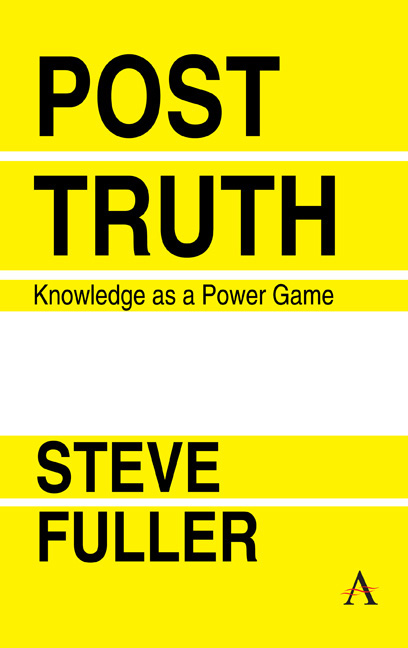Book contents
- Frontmatter
- Dedication
- Contents
- Acknowledgements
- Introduction: Science and Politics in a Post-Truth Era: Pareto's Hidden Hand
- 1 Brexit: Political Expertise Confronts the Will of the People
- 2 What Philosophy Does and Does Not Teach Us about the Post-Truth Condition
- 3 Sociology and Science and Technology Studies as Post-Truth Sciences
- 4 The Post-Truth about Academia: Undiscovered Public Knowledge
- 5 Science Customization: A Project for the Post-Truth Condition
- 6 The Performance of Politics and Science on the Playing Field of Time
- 7 Forecasting: The Future as the Post-Truth Playground
- The Argument in a Nutshell
- Glossary
- References
- Index
Introduction: Science and Politics in a Post-Truth Era: Pareto's Hidden Hand
Published online by Cambridge University Press: 14 July 2018
- Frontmatter
- Dedication
- Contents
- Acknowledgements
- Introduction: Science and Politics in a Post-Truth Era: Pareto's Hidden Hand
- 1 Brexit: Political Expertise Confronts the Will of the People
- 2 What Philosophy Does and Does Not Teach Us about the Post-Truth Condition
- 3 Sociology and Science and Technology Studies as Post-Truth Sciences
- 4 The Post-Truth about Academia: Undiscovered Public Knowledge
- 5 Science Customization: A Project for the Post-Truth Condition
- 6 The Performance of Politics and Science on the Playing Field of Time
- 7 Forecasting: The Future as the Post-Truth Playground
- The Argument in a Nutshell
- Glossary
- References
- Index
Summary
‘Post-truth’ may have been declared word of the year for 2016 by the Oxford English Dictionary, but the concept has been always with us in both politics and science – and in much deeper ways than those who decry its existence realize. A long memory is not required to see its roots in politics. Recall 2004–s coinage of ‘reality- based community’ as an ironic counterpoint to George W. Bush's approach to foreign policy, especially after the start of the Iraq war. Nevertheless, it is interesting to see the exact dictionary definition of ‘posttruth’, including examples of usage:
Relating to or denoting circumstances in which objective facts are less influential in shaping public opinion than appeals to emotion and personal belief:
‘in this era of post-truth politics, it's easy to cherry- pick data and come to whatever conclusion you desire’
‘some commentators have observed that we are living in a post-truth age’
This definition is clearly pejorative. Indeed, it is a post-truth definition of ‘posttruth’. It is how those dominant in the relevant knowledge- and- power game want their opponents to be seen. In this context, the word ‘emotion’ is a bit of post-truth jargon that only serves to obscure the word's true function, which is to gain competitive advantage in some more or less well- defined field of play.
Those who are most resonant to our living in a ‘post-truth’ world believe that reality is fundamentally different from what most people think. This applies to both sides of today's ‘post-truth’ divide: the elite experts and the populist demagogues. Informing it all is Plato's view of the world, which Niccolo Machiavelli helpfully democratized in the Renaissance. It was then updated for the capitalist world by the political economist Vilfredo Pareto (1848– 1923), one of sociology's forgotten founders, an inspiration to Benito Mussolini and the man who was still cast in my youth as the ‘Marx of the Master Class’, given his respectful treatment by such Cold War liberals as Talcott Parsons and Raymond Aron (Parsons 1937: chaps. 5– 7; Aron 1967: chap. 2). If anyone deserves to be the patron saint of post-truth, it is Pareto.
For Pareto, what passes for social order is the result of the interplay of two sorts of elites, which he called, following Machiavelli, lions and foxes. Both species are post-truth merchants.
- Type
- Chapter
- Information
- Post-TruthKnowledge as a Power Game, pp. 1 - 8Publisher: Anthem PressPrint publication year: 2018

